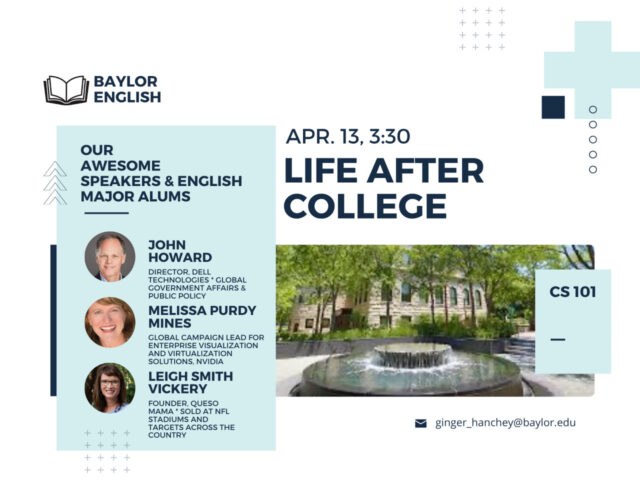By Julianne Fullerton | Reporter
Baylor’s English department hosted a panel of three distinguished department alumni Thursday afternoon as part of its new “Life After College” series. Panelists spoke to students about how their English degree can lead to an abundance of career options.
The panel was organized by Dr. Ginger Hanchey, senior lecturer in the English department, who began the discussion with a message to the students in attendance.
“Our panelists are very impressive, but they’re here today because of you,” Hanchey said. “They care about you. You’re part of the Baylor family, you always will be. We just really want you to know that your lives today matter to us, and your futures matter to us.”
Panelists included Melissa Purdy Mines, John Howard and Leigh Smith Vickery, all of whom have successful careers in high-ranking business positions. They emphasized there is no linear path from an English degree to a successful career, as their own career journeys were far from it.

As a Baylor Regent and global campaign lead for enterprise visualization and virtualization solutions at NVIDIA, Mines said she works with a team that is a “translation layer” between the product and the market.
“What my team does is figure out what businesses need and then how to translate something very technical to that audience and then the best way to reach them,” Mines said. “At a very basic level, we’re just trying to make sure that what we do is well understood by our buyers.”
Howard’s expertise in environmental law post-grad led him to work at the White House under the Bush administration, which in turn opened the door for him to work at Dell Technologies. As director of global and government affairs at Dell, he said he spends his days building relationships and developing public policy.
“I spend my day working on community relationships, so just making sure we have good relationships and that they understand what Dell is doing, what Dell might need,” Howard said. “If there’s a new bill in the legislature that might impact us, I’m the first person to take a stab at what that means for us.”
As an entrepreneur and founder of Queso Mama — a company that supplies queso to NFL stadiums and Target stores across the nation — Vickery said everything comes back to building a brand. She said the power of telling a story is incorporated into everything she does.
“English majors are very good at figuring out what that story is, and how do I get you to see yourself in my story?” Vickery said. “That’s where I spent most of my time, is how I built a brand and then hired out everything I could not do. At the end of the day, you’re in charge of everything, but you don’t have to know everything.”
Mines said having an English degree taught her to think and connect well, allowing her to live out her dream of living in both New York City and San Francisco.
“You’re taught to think,” Mines said. “You’re taught to be curious. You’re taught to understand and debate and get to know people. Finance majors can run circles around me, but I learned to connect and ask questions that really helped me network, and that helped me succeed.”
For aspiring students who are uncertain about what their future with an English degree may hold, Mines said she encouraged flexibility and creativity.
“I don’t know what jobs are going to exist in 10 years; I cannot tell you that,” Mines said. “What I can tell you is what we need most in the future are people who can be incredibly flexible, incredibly curious, and also who have an understanding of human nature.”
Howard echoed the great need for an adaptable workforce.
“The workforce needs people who are flexible, who can think and analyze critically, who can change and adapt, who can write different things for different audiences and be able to translate and interpret — not the people who know a certain amount of equations,” Howard said.
Skills are beneficial for future success, but the panelists also encouraged students to understand the value of networking. They said if you don’t reach out to people, you never know what you have to gain.
When it comes to interviews, Vickery said students should strengthen their ability to anticipate and think past the first step.
“If you’re interviewing with someone, know every single thing about that company and then anticipate what they might need,” Vickery said. “Show you can think ahead. Help them understand that you can see the whole picture of the company, that you’re not just seeing your piece, but that you understand how your piece fits their goals of the whole company.”
Ultimately, the panelists encouraged English majors to fully embrace their degree and to understand that having a liberal arts education is an asset.
“Be proud and be confident,” Mines said. “It is not a position of deficit. If it is your strength, then it is your strength.”





